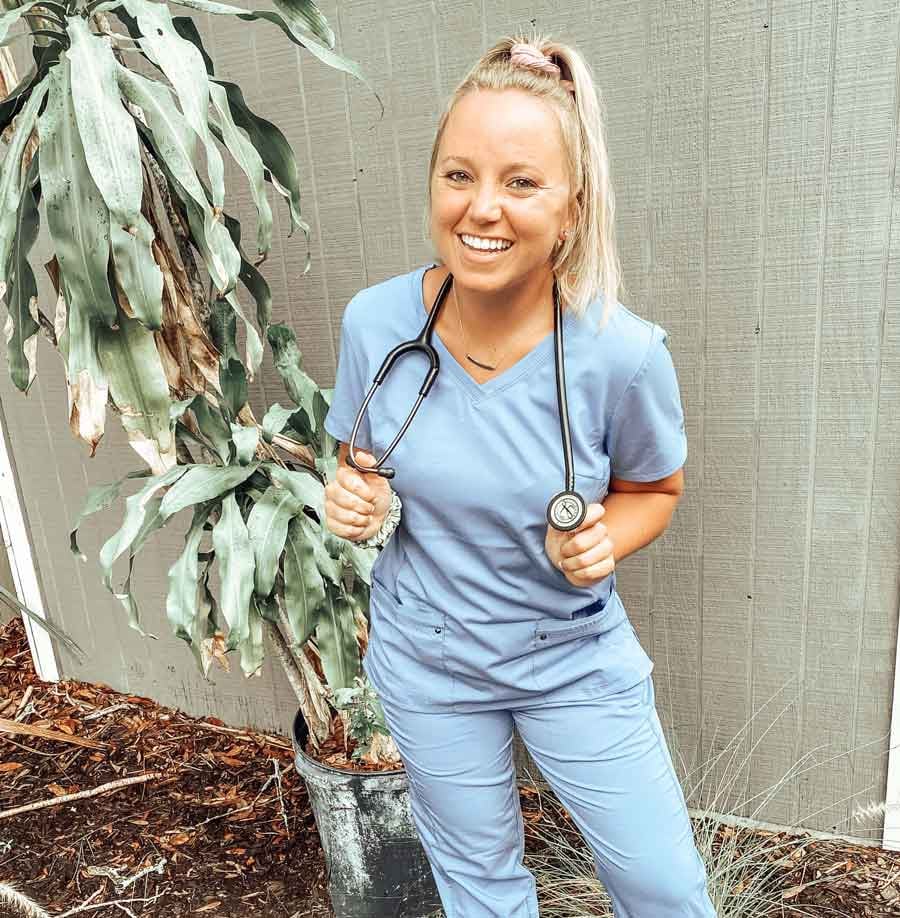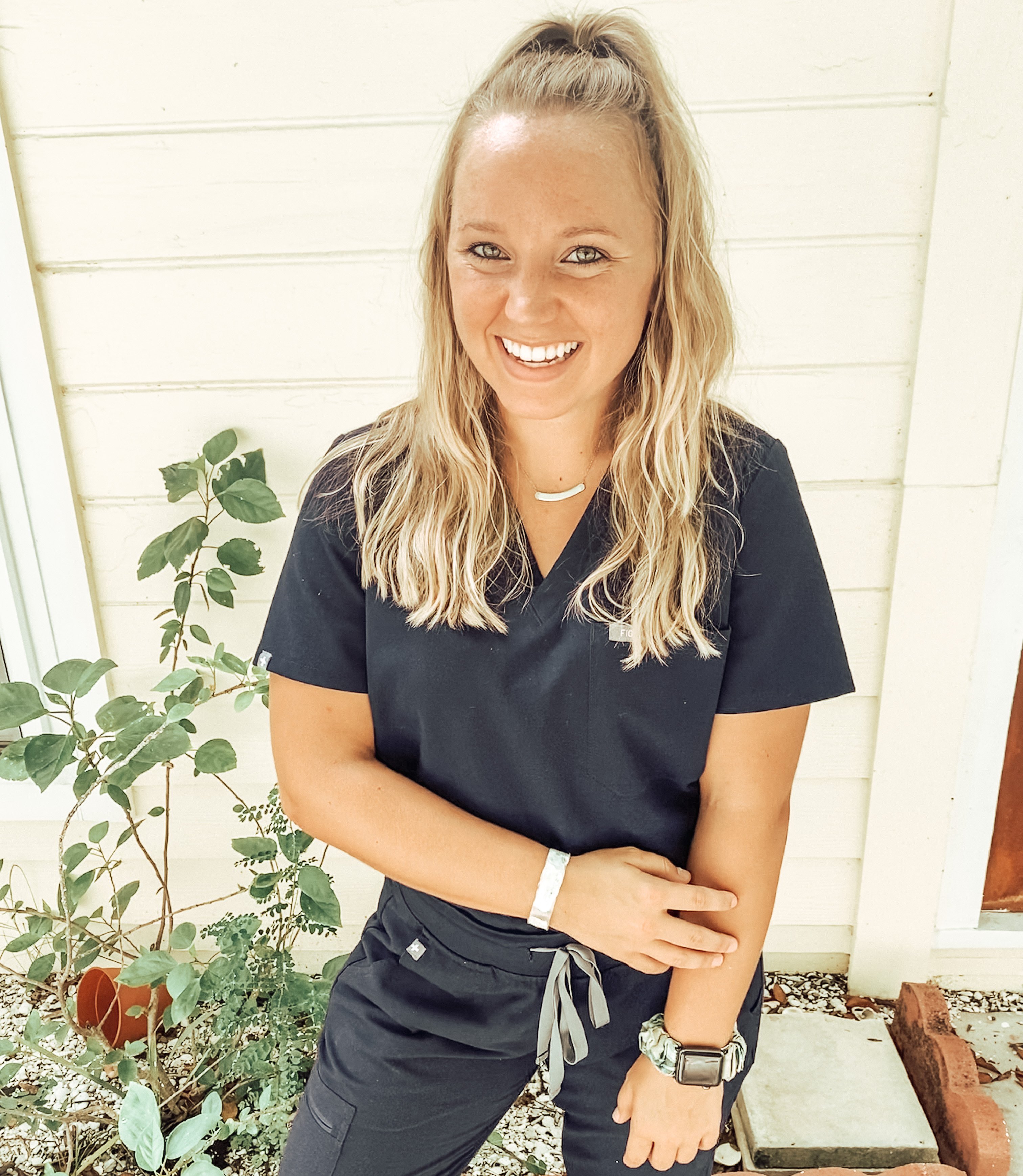This article was provided by Triage.
Kahla: Travel Nursing Plans During a Pandemic
Be honest. You’ve considered traveling as a medical professional, but the thought of leaving the comfort of your home, a steady job, family, and friends, gives you the sweats a little. It’s fine, we understand. But how do you feel about regret?
Take it from this young lady, Kahla (pronounced Kay-lah), a registered nurse who “leaped” as a first-time traveler in the middle of a pandemic: “I just have always known that it was something that I wanted to do and I knew that if I didn’t go for it, I would look back later in life and regret it,” she said.

On How She Got Here:
Kahla is one of those rare breeds of humans who knew what she wanted to be when she grew up straight out of high school. Anatomy and physiology classes had her dreaming about scrubs and stethoscopes, so she knew she wanted to be in the medical field.
Deciding what program to take, Kahla considered what she wanted in patient care. “Did I want just to go around and talk to people for five minutes and then not see them again for a couple of days,” she thought, “or do I want to work 12-hour shifts with the same people and actually get to know them and interact with them?” From there, she chose the ladder and began working toward a career in nursing.
While researching the medical field and deciding which nursing route to take (always researching with this girl), Kahla came across a travel nurse job listing. “I might have even been looking at ‘highest paying nursing jobs,’ and travel nursing was on that list,” she said. Pff, ain’t no shame in that game!
Generally, hospitals and medical facilities require a traveler to have two or more years of experience under their belt. Why? For many reasons, but one of which being, they need you to hit the ground running basically day one. You’re only there for three months, and they can’t afford one of those months to be spent on training.
Due to the pandemic, however, several healthcare systems around the country eased their requirements, so travel medical pros who had less than two years of hospital experience could assist.
You can see where “lucky” would be an odd way to describe Kahla having the opportunity to travel before most, but it gave her a jump-start she’s admittedly thankful for.
“Honestly, I was getting burnt out with my first job, and I was just kind of tired of some of the things that were going on there,” she said. “So I just was like, ‘You know what? Screw it. Why not now?’” After that, she took her first contract assignment.

On Connecting with a Recruiter:
Even “newbies” in the medical travel world know that options probably won’t be a problem once you put your feelers out there. Usually, getting your phone to stop ringing is the issue.
Jill, a social media recruiter at Triage, contacted Kahla via Messenger. After texting back and forth for a while, they hopped on a call that Kahla describes:
She was just super personable, social, and cared about me more than getting me to travel. I’ve had many phone calls with different recruiters where they answer [the phone], and they’re like, ‘okay, where do you want to go, and what’s your specialty?’ They didn’t ask any life questions. With Jill (and Robyn), I felt as if I was talking to my friends. I need that personal connection—to know that they have my best interest in mind and aren’t just trying to give me a job to get money.
On Choosing an Assignment:
Every travel nurse has their reason for experiencing the travel life—most have a few. It’s really about prioritizing your reasons and choosing assignments based on that hierarchy. For Kahla, her priority when it comes to picking an assignment is location, location, location.
“I feel like a lot of people right now will just go wherever the highest-paying job is, but I try to find a hospital in an area that I want to visit, usually because I have friends or family there,” she said. “But, when it comes to specific contracts, definitely the specialty!”
During her search for an assignment in Florida, she was sent positions for specialties she had no experience with, such as neuro.
“I’m like, ‘me and neuro? Ha!” she laughed. “I’m just not a neuro person—so, specialty is a big one for me and so is a shift.”
We’re telling you, we’ve found a unicorn with this one. Kahla prefers…wait for it…the night shift! In fact, she loves it. Yes, we know (and so does she), at almost 24, she’s probably better equipped to handle the “nightlife.” But, it’s not just that, she claims. Aside from it working better with her lifestyle, she also likes “the flow of work a lot better.”
“We definitely still have busy nights,” she explains, “but it’s nice to actually get time to sit down and talk to your patients if they’re still awake, or just sit down and talk to your coworkers instead of running around with a million people around you.”
So young, yet so wise, Kahla shares a couple of interview tips she has used, or plans on using:
“Right now, it’s self-explanatory why they need travelers during the pandemic with COVID,” she said. “But, when it dies down, I’ll start asking—trying to figure out what I’m getting myself into.”
On the Travel Life:
It’s been a long-standing rumor (and we say rumor because we aren’t there to bear witness) about perm staff treating travelers with, perhaps, a bit of jealous disdain. Thankfully, Kahla says, “for the most part, everyone’s pretty welcoming and helpful” and here to shed some light on the topic:
I’ve heard that’s one thing that holds many people back from travel nursing because they’re afraid of getting the worst assignment on the floor with the worst patients. But, for the most part, that really hasn’t happened to me. If it does happen to me, I’m a one-day-at-a-time type of person. I think, ‘tomorrow’s a new day; I can do this for 12 hours.’ I don’t really let it get to me. I’m not going to let that hold me back from continuing to travel and live the life I want to live.
Many-a-traveler has told us their favorite aspect of contract assignments can stay out of “workplace politics.” Bad attitudes? Take it with a grain of salt. It’s their problem, not yours. Boo-yah!
“It’s nice just not to have to be attached to something; you can just do your job and get out,” she said.

Kahla works hard to live the life she’s always dreamed of, including taking care of herself mentally and physically. This go-getter is also a part-time fitness coach (holy tenacity, Batman).
“If I didn’t work out and live the healthy lifestyle that I do, I think I would lose my mind,” she said. “Especially with nursing—I’m a firm believer that we have to take care of ourselves before we can do anything else and take care of others.”
We 100% agree.
The best part about the #TravelNurseLife? “One is obviously traveling,” she laughed. “Two, it definitely pays more. I feel like, as nurses, we do not get paid enough for what we do; but as a traveler, I feel like I’m making what I deserve.”
Cheers to that, friend!

On Where to Next:
Kahla is now finishing up her second assignment in sunny Florida and wondering, “where to next?” You’d assume with all the research this gal does; she’d have the next 30 years planned, right?
“I kind of had a plan, but I’m learning that plans don’t always go as planned,” she said. “So, I do, but I don’t; I’m more so kind of just doing it and going with the flow.”
With COVID-19 shutting the world down (something nobody thought possible), we’ve all learned the same lesson about plans. They’re nice to have, but sometimes the plan has to be to go after it.
Follow Kahla on her IG (Walkerk.fitRN) for some motivation, travel nurse tips, and a smile that will brighten your day.
Are you a staff nurse with travel nursing plans? What holds you back from making these travel nursing plans a reality? Comment them below. Are you a travel nurse that had travel nursing plans for years before making the leap? What finally made you put those travel nursing plans into reality? Comment those below as well.
Finished the travel nursing guide and are ready to look for an assignment?




